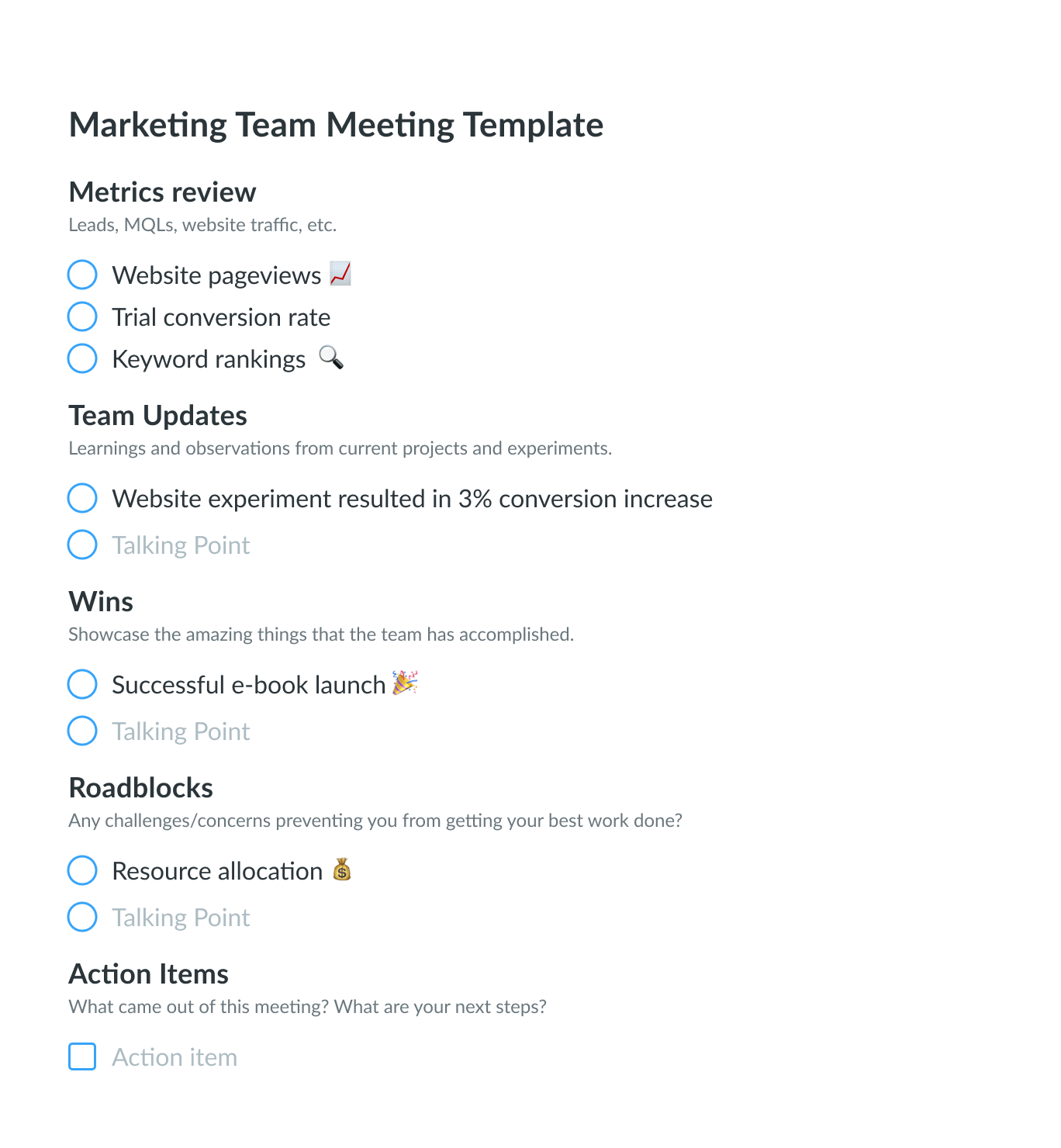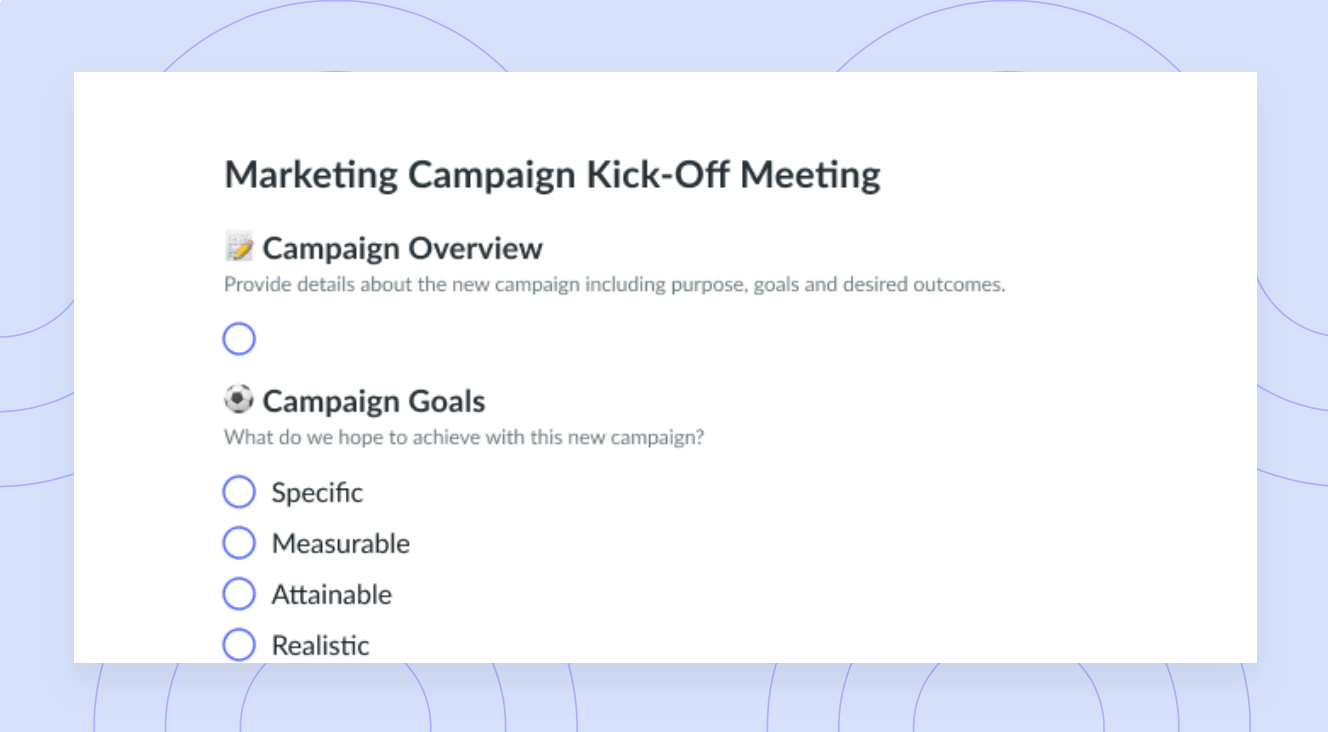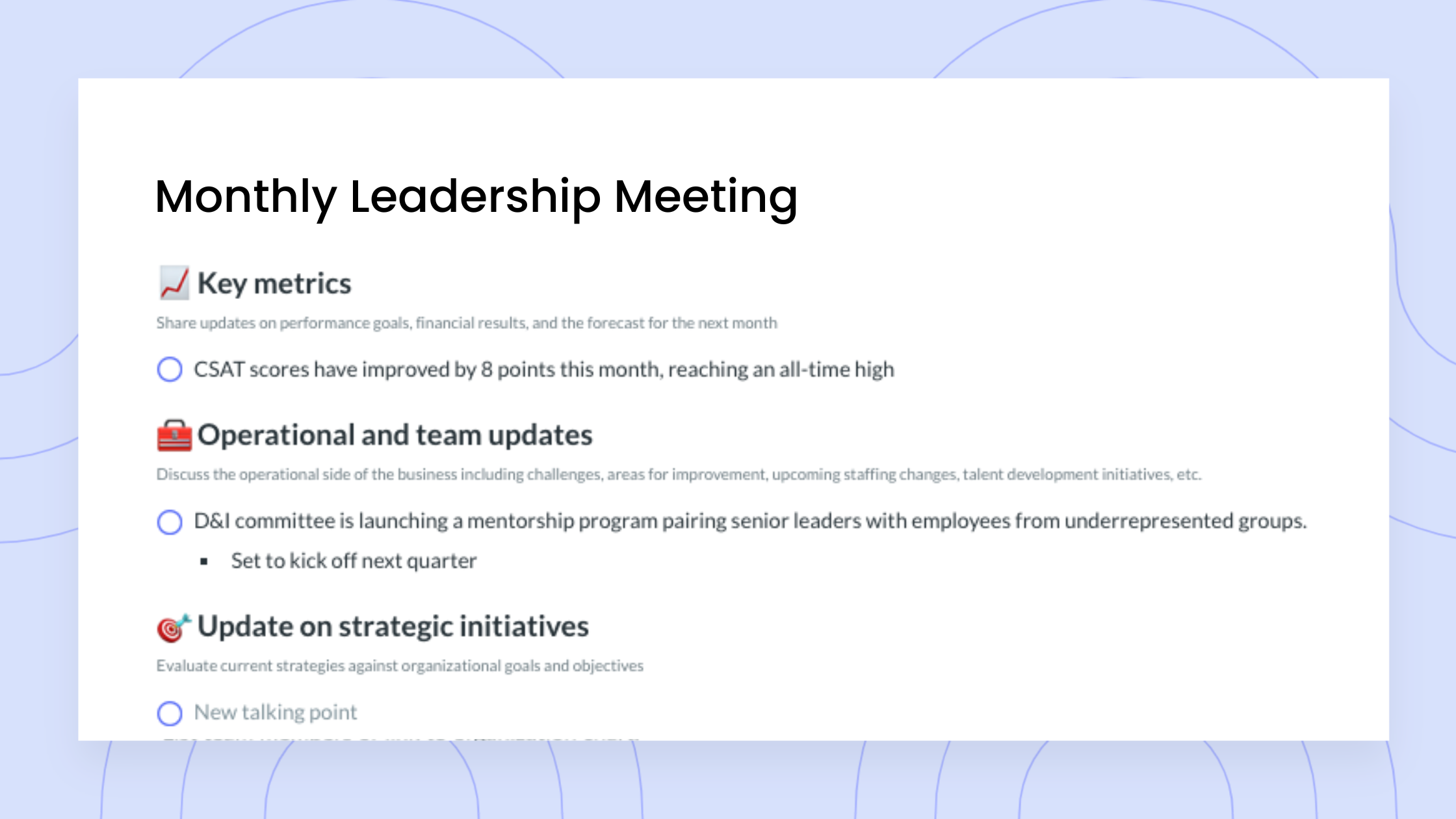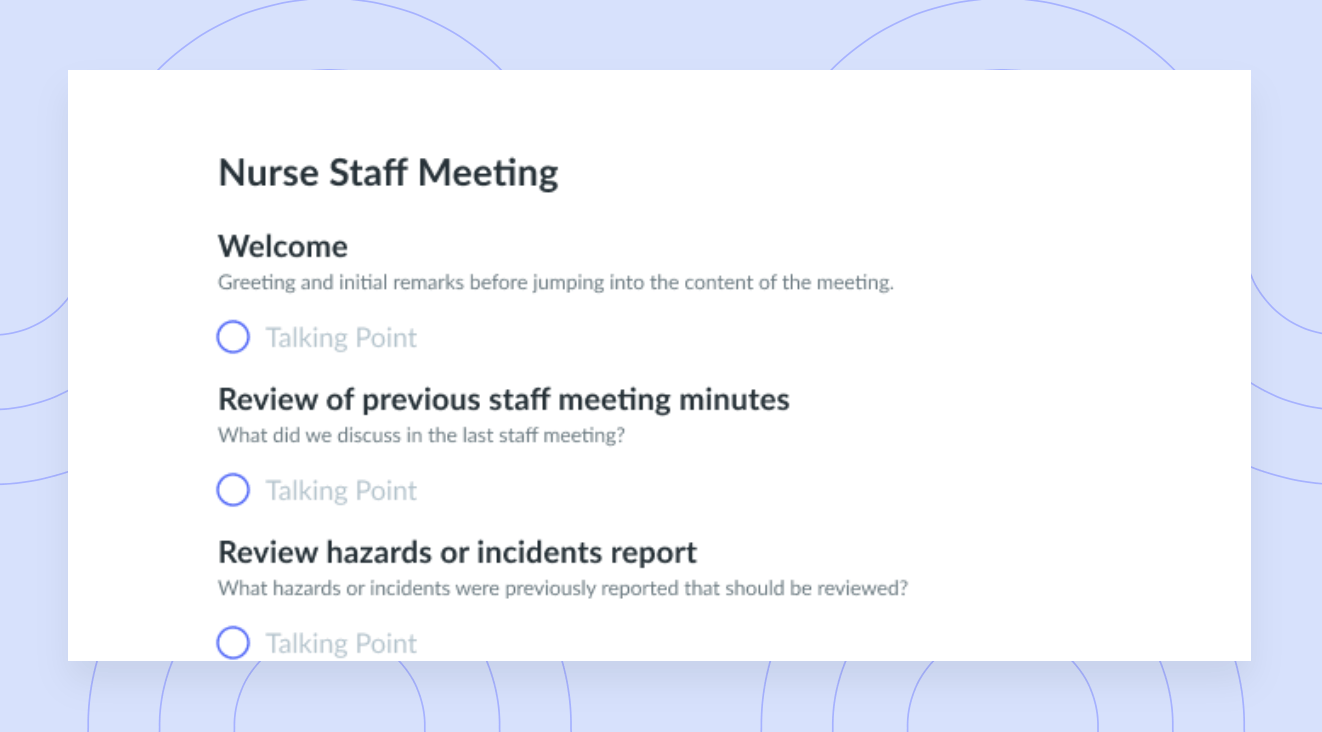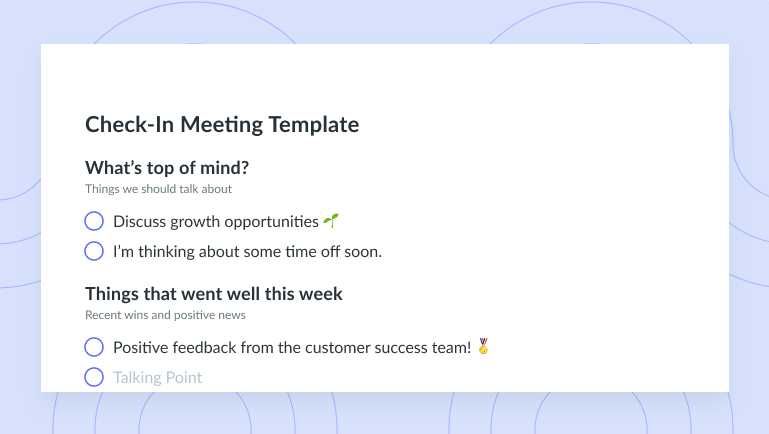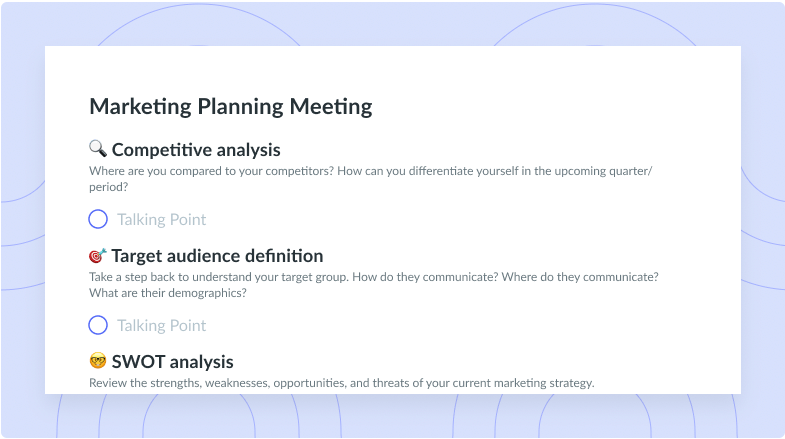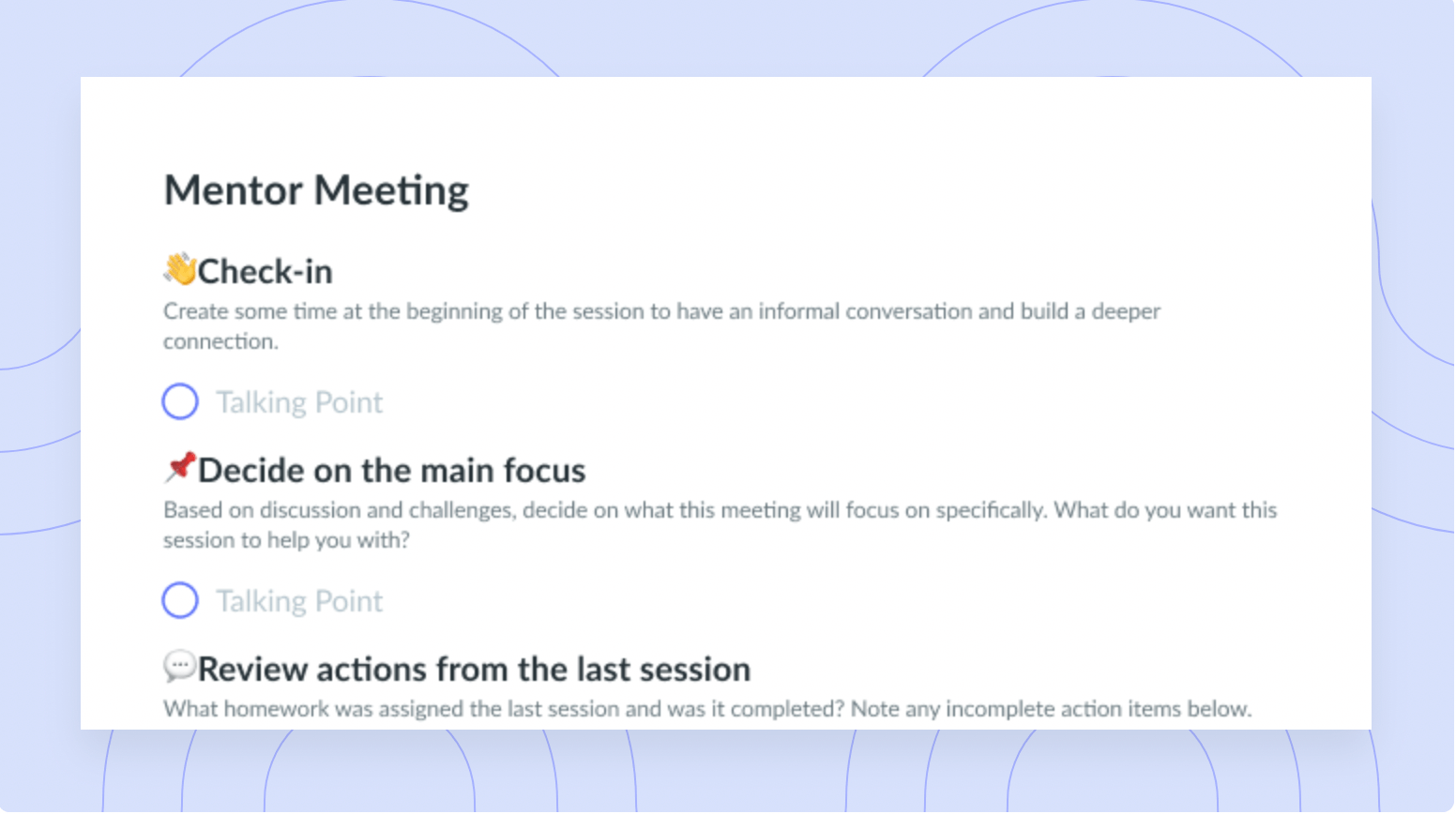
Marketing Meeting Agenda Template
Get this templateRun effective and organized marketing meetings with our Marketing Meeting Agenda Template. This template helps teams ensure clear communication, track progress, share metrics, and identify challenges. Use this template in Fellow to collaborate in advance, track action items, and capture everything with AI-generated summaries.
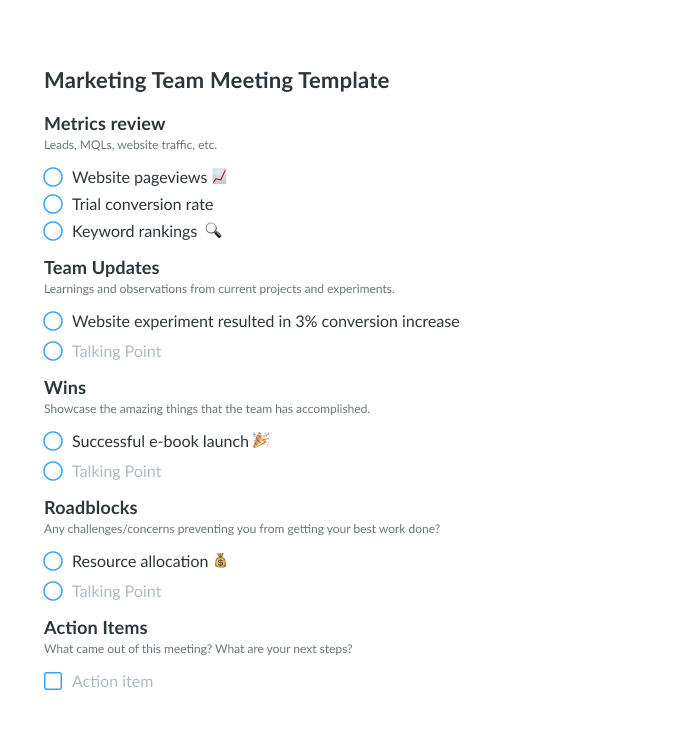

The Marketing Meeting
Marketing at its core is about understanding people — specifically your potential customers — then planning things that help steer them towards your company’s (or client’s) product or service. As a result, marketers deal with many competing priorities and significant pressure to demonstrate the value of their work.
With so much on the go at all times, it makes sense that marketing teams might be somewhat meetings-averse. A lot of marketers feel like weekly meetings are a waste of their precious time. But with so many balls in the air — clear communication is crucial to making sure your plans are executed properly.
To help your marketing team balance their many competing priorities, your weekly team meeting needs to:
- Have a clear, focused agenda.
- Show them their progress on relevant metrics and goals.
- Help them assess the success of their campaigns and testing.
- Identify challenges and opportunities for new strategic iterations.
- Outline actionable next steps.
What should you include in your weekly marketing meeting agenda to meet these requirements? Use this template to run weekly marketing meetings that drive great results.
What’s inside this marketing meeting template:
1 Metrics review
Starting your weekly marketing meeting with a metrics review gives your team a clear benchmark for the rest of the discussion. Focus on the numbers that your marketing team is measuring. The specific metrics will depend on what KPIs have been set, but keep this related to big picture goals.
For instance, in an article on the HubSpot marketing blog, Hubspot CMO Mike Volpe says:
“Being able to consistently hit your website’s traffic goal and provide the right number of quality leads to your sales team are two of the most crucial responsibilities of a marketing team.”
- How many leads have you generated?
- How many of them are organic vs. paid?
- How big is the pool of marketing qualified leads going to the sales team?
- Are you meeting your website traffic goals? Daily? Weekly? Monthly?
- What is your overall conversion rate?
- How much revenue has been generated as a result of your team’s activities?
This is your opportunity to present the data that answers these questions.

2 Team updates and experiments
This part of the meeting will enable your team to discuss what they’ve been working on, share findings from testing initiatives, as well as discuss new opportunities on the horizon.
- Has the team been A/B testing email subject lines or developing an automated drip campaign?
- Is it working?
Make sure individuals share what they’ve learned in their experiments because it could be useful knowledge for the whole team that drives better results.
- Is analytics data suggesting a new type of user persona clicking through on ads or engaging with content on social media?
This section of the meeting agenda is the time to discuss how these types of discoveries will impact your overall strategy.
3 Wins
Celebrating victories in your weekly team meeting is a great way to keep morale high.
- Has your latest campaign earned some press coverage?
- Is someone on your team being invited to give a keynote or participate on a panel?
- Has an influencer taken notice of or shared your company’s product on social media?
Give kudos where kudos are due! Take your winning tactics and brainstorm ways to apply them across other channels. This is your time to let the team know what’s been going well and how their efforts are contributing to the company’s success.
4 Roadblocks
Just as important as understanding your wins understands your failures and the challenges your team is facing.
Pressure to perform is something all marketers experience — so roadblocks and failures can be difficult to discuss openly. That’s why, for productive meetings to happen, you should create an environment where the team feels comfortable having these conversations. According to Paul Axtell:
“In the process of having more candid, mutually respectful conversations, your team will become more cohesive and able to work together more powerfully. They may even begin to look forward to your meetings because of the remarkable conversations that permission and safety create.”
In other words, fostering openness will help the team grow together and you’ll be better positioned to identify opportunities for improvement.
In his 2016 TED Talk, Adam Grant, the author of Originals says:
“The things we wish we could redo, if you look at the science, are the chances not taken. […] If you look across fields, the greatest originals are the ones who fail the most, because they’re the ones who try the most.”
Don’t let your team be too afraid of failures. Use this part of your weekly marketing meeting as an opportunity to come up with new ideas to overcome your challenges.
5 Action Items
The biggest secret to a productive weekly team meeting is concrete outcomes.
Take this time to make sure everyone understands their responsibilities and priorities in meeting your overall marketing objectives. Make sure everyone is on the same page and that each person knows what contribution they’re making towards the team’s goals.
If you use this template in Fellow.app, it will help your marketing team stay aligned on goals, track them effectively, and adjust your strategy with real metrics when you’re facing challenges. This awareness will ensure that your marketing team is set up to succeed!
Steven G. Rogelberg, a Professor of Organizational Science, Management, and Psychology at UNC, Charlotte has studied running effective meetings extensively. In a 2019 piece for the Harvard Business Review, he says:
“Meetings can efficiently bring together ideas and opinions and allow people to do their jobs in a more coordinated and cooperative manner. They help individuals form a coherent whole that is more adaptive, resilient, and self-directing, especially in times of crisis. Perhaps most important, meetings help establish and promote consensus, thus serving as a focal point for collective drive and energy.”
Marketing is planning, and a successful plan requires coordinated efforts and awareness across your team. Marketers might feel like they can’t afford the time a weekly meeting takes, but if you structure your weekly marketing meeting correctly and make sure you’re providing value to your team, it will become a powerful tool to drive successful campaigns and demonstrate a strong ROI to the higher-ups at your organization.



